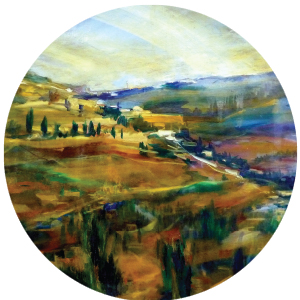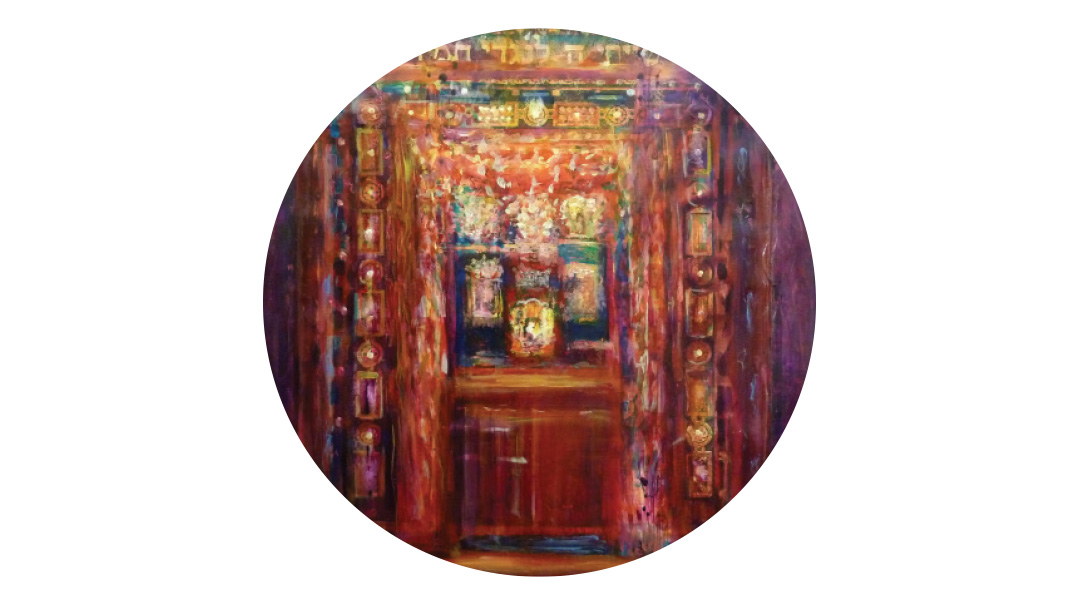Planting Eternity

Can we escape the malaise of an unfruitful life?
It’s Tu B’Shevat. Spring is on the horizon.
Hashgachah had me find a fascinating essay that puts this time of year in perspective. It quotes an idea from Rav Aaron Levine ztz”l, longtime rabbi of Young Israel of Avenue J. Rav Levine brought up the most practical but not commonly discussed halachic understanding of Tu B’Shevat: that it’s the cutoff date for transferring terumos u’maasros to the Beis Hamikdash.
If there were no cutoff date, the amount people owed to the Mikdash could accrue, and their attitude toward paying their dues could become lackadaisical. This would naturally spill over to mitzvah performance in general. So one of the central messages of Tu B’Shevat is to become more exacting in our mitzvah performance.
Gratification Delayed
Rav Levine makes a fascinating comment in the essay: “If we adopt a short account period for accounts payable, we must adopt a long accounting period for accounts receivable.” A “long accounting period for accounts receivable” is the faith our people have that “keren kayemes l’Olam Haba.”
My husband often mentions that when we purchased our home in Shaarei Chesed, he was disappointed that even though there were many streets in the neighborhood named for distinguished rabbanim, we ended up on Keren Kayemet Street.
But when we focused not on the municipal building at the end of the block for which the street was named, but on the meaning of the words, we were mollified. The keren — the glory and glow, is kayemet — perpetual; it’s payable in a World unknown to us, but which we’ll all eventually enter.
I recall the dignity of Mr. Joseph Lefkowitz, a nonagenarian Holocaust survivor whom I feel honored to know. His son Tuvia was Rachmana litzlan tragically killed this year in a car accident on his way to shul for Selichos. During the shivah, his daughter recounted, no one knew what to say to Mr. Lefkowitz to comfort him. But his greeting to all who came to be menachem avel was to point a finger to Heaven and say, “I have no questions.”
No questions!
My husband’s grandmother, Mrs. Adina Russack a”h, loved to remark, “Down here there are no answers; up there, no questions.”
I can testify that Mr. Lefkowitz lives with two feet in this world and a steadfast belief in the reality of Olam Haba. The lens through which he looks at life enables each of his days to be filled with serenity, even at times when he can’t be truly joyful.
Reward Will Come
The Talmud (Kiddushin 39) teaches us that the reward for mitzvos isn’t given in this world. I read in an article by Rav B. Weintraub: “Your mitzvos have a quantitative effect on the person that you are in this world. You will have a positive influence on others based on your Torah life and the way you live it. The kiddush Hashem that you will bring into your world is immeasurable — you will be a person that feels that you are living a life of purpose and sanctity. However, the qualitative effect of your mitzvos will be entirely in the next world.”
Rav Wolbe ztz”l elaborates on this idea (Alei Shor, 4). The difference between a Torah life and a superficial life based on the belief that nature takes its course is unquantifiable. A Jew can live a just and moral life with 2.5 children, a nice house, and a car, but without Torah, his life is missing the pulse for which his heart was meant to beat.
Such a person will try to enjoy every pleasure available in this world but never achieve any lasting satisfaction. His lack of yearning to grow will paint his world meaningless and futile. Rav Wolbe cautions that even the “frum” Jew can get caught in the malaise of living an unfruitful life.
The Jewish Way Is Sweet
From the outset of man’s creation, we were given the choice to pursue either of these options. Early on, the Torah recounts the poor choices of the Dor Haflagah and the Dor Hamabul.
For most people, “the now” is reality as I choose it to be. Any opinion that opposes my perspective is considered closed-minded and archaic. Fortunately, we realize that emes isn’t arbitrary. Our lives as frum Yidden are propelled by the absolute and timeless truth of Torah, which sets our lives on a course toward Olam Haba.
The Gemara (Taanis 23a) relates a story about Choni Hame’agel. He was perplexed by the meaning of this verse: “A song of ascents. When Hashem brought back those who returned to Tzion, we were like dreamers” (Tehillim 126:1). He wondered how it was possible to sleep for 70 years and why the Torah would compare the 70 years of galus Bavel to a long dream.
One day, Choni saw an older man planting a carob tree. “After how many years will this tree bear fruit?” he asked.
The man replied that it wouldn’t produce fruit for 70 years.
Choni asked why he was planting a tree if he didn’t expect to live to enjoy its fruit. The man responded that just as his ancestors planted carob trees from which he benefited, he, too, was planting for his descendants.
That night, a cliff formed around Choni, and he disappeared from sight and slept for 70 years. When he awoke, he saw a man gathering carobs from that tree. “Are you the one who planted this tree?” Choni asked.
“I’m his grandson,” the man responded.
The message of this story is that the work we do each day can blossom into something amazing. It just takes time.
In a speech in our White Shul about five years ago, Rav Zev Leff shlita quoted a beautiful midrash recounting that Avraham Avinu went on a “pilot trip” to Eretz Yisrael six years before his momentous “lech lecha.” What confirmed for him that this foreign land of Canaan was the place he’d ultimately settle?
He saw people there were planting things they’d never benefit from in their lifetime. He gleaned from this that Eretz Canaan is a future-oriented land, and he saw this as a suitable place to plant the seeds of our nation.
Returning to Rav Levine’s remarks, when it comes to anticipating the reward for shemiras mitzvos, we must show patience and forbearance; rushing to fulfill mitzvos, but waiting patiently for the dividends is the Jewish way of life.
The lessons of the tree can be summarized in the following incident (Shemos 15:25): “So he [Moshe] cried out to the Hashem, and Hashem showed him a piece of wood. He threw it into the water, and the water became sweet.”
The sweetness is that a Torah life has meaning every day. Each day is part of a multilevel structure we’re constantly building. And just like the tree takes time to grow to maturity and produce fruit, we all aspire to use our 120 years to fulfill our potential and ultimately enjoy the fruit of our labor in Olam Haba.
Each leaf on every tree creates the oxygen that keeps us all living. A tree grows from the roots, trunk, and branches, and it takes perseverance and hard work to take care of it so it’ll produce fruit. So too, each stage of our lives is part of the process of growth, with our constantly lengthening branches channeled toward an Eternal Life.
Rebbetzin Aviva Feiner is the rebbetzin of Far Rockaway’s Congregation Kneseth Israel (The White Shul) as well as a mechaneches in TAG and a visiting lecturer at Stern College.
(Originally featured in Family First, Issue 776)
Oops! We could not locate your form.







